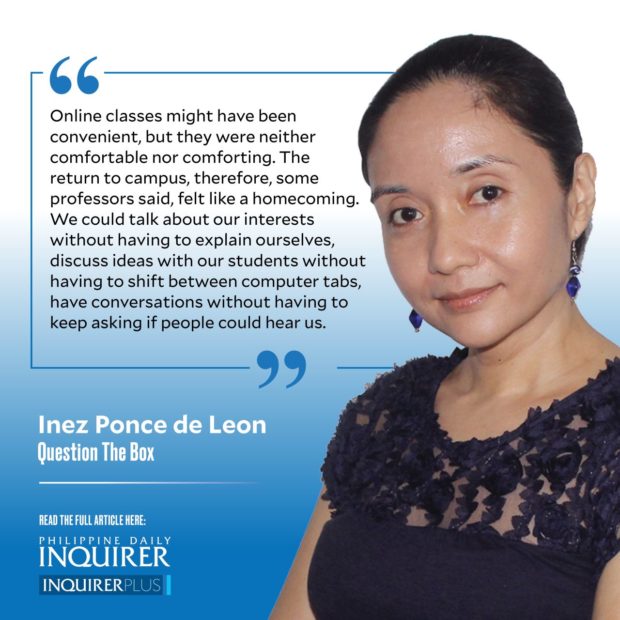Let the new stories begin
We had one of our first on-campus events last weekend: We brought the senior batch of communication majors together to orient them on their thesis. Most of them didn’t seem too excited to come; but by the end of the afternoon, they were laughing, taking selfies, and bathing themselves in alcohol before hugging each other. They recognized that they were going through a ritual together; and that being together, in the same place, at the same time, could somehow push them nearer to graduation.
This was a common sight on our grounds as the Ateneo Loyola Schools finally went onsite. For the first time in two years, a campus that once tittered with crickets and hushed voices was ringing with the shouts of students again.
We didn’t know how good we had it until the pandemic took our lives away two years ago. The sudden shift to online classes was supposedly something that our department was used to. We had already been offering it for years to our graduate students, so it shouldn’t have been too much trouble for our undergraduates.
Instead, it was like being on an escalator that suddenly stopped, and we had to hunt for stairs that would take us to somewhere that we couldn’t define. Though many of us adapted to the circumstances, we all wished for the isolation to end.
Teachers are performers: Many of us work through sickness, tired spirits, and lack of sleep. But we have to put our best foot forward, and this becomes less rewarding when it is done on a computer screen. There is no material feedback on which to base our next moves. All reactions seem to be mere symbols rather than reality, emojis rather than emotions. In the classroom, the laughter, the thoughtful “oh,” the prized open-mouthed wonder at a new idea—these resonate like echoes of knowledge being assimilated, experienced, appreciated.
We, at the tertiary level, are also scholars: We have to contribute to knowledge, publish our work, and network with other researchers. Research can be a solitary endeavor, but there is nothing like a conversation with colleagues to jumpstart one’s brain, to make one see beyond the entanglements of data, and conceptualize a singular idea that can change how we understand humanity.
Online classes might have been convenient, but they were neither comfortable nor comforting.
The return to campus, therefore, some professors said, felt like a homecoming. We could talk about our interests without having to explain ourselves, discuss ideas with our students without having to shift between computer tabs, and have conversations without having to keep asking if people could hear us.
It was also rough: We had several downpours, threats of flooding, traffic, massive internet outages, and some classes still fully online—but they all paled in the warmth that the classroom brought. As I listened to the laughter in my research class, sensed the hum of activity in my dance classes, and discussed topics and theories with my thesis students, I felt like I had returned to a home that I had to construct with my own hands, but whose building invigorated me.
Coming back to campus has allowed us to share the same space with our students as they uncover new knowledge, discuss their ideas with us, and even discover strength and joy that they did not know they still had. The onsite classes are also allowing some of us to hope, and to look forward to the lectures and discussions that are best done live.
For my part, I can’t wait to hear my dance students giggle as they discover muscles that they didn’t know they had, for my thesis students to articulate hitherto unrealized connections amongst their college subjects, and for my research students to meet up with Marxist critical thinking and sink into the depths of philosophy, sociology, and rage that make communication a social sciences field.
The onsite classes are perhaps the best place to open the students’ eyes to the currents of politics that run through their lives. Whether they are learning a dance that represents contestations of female power or using theoretical frameworks to explore reality, they must be able to debate, discern, and think. As they finally make it to campus, I hope that they discover how they, as the author Salman Rushdie says, can sing the truth, name the liars, and tell better stories than the tyrants.
iponcedeleon@ateneo.edu





















